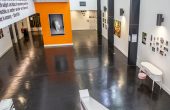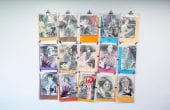“Have nothing in your house that you do not know to be useful, or believe to be beautiful” – William Morris
Yesterday I enjoyed a fabulous visit to the William Morris Gallery in Walthamstow. I was joined by Ligaya Salazar, Director of the Fashion Space Gallery here at LCF and our Professor of Fine Art, Charlotte Hodes.
The gallery, set in Morris’ former home in Walthamstow, is fittingly, very beautiful.
We met with Lorna Lee (Head of Culture and Heritage Services, London Borough of Waltham Forest), keen to explore possible opportunities to work with the borough of Waltham Forest as we plan our move to Stratford.
I was pleased to see that the possibilities for collaboration are really endless and was inspired by the collections – and stunning gardens!

There were original designs, textiles, wallpapers, furniture, stained glass, ceramics, metalwork, books as well as personal items, such as his coffee cup and satchel. The fascinating range of items reflects the incredibly diverse aspects of Morris’s career – as a poet, designer, craftsman, retailer and social activist.

Through the tour I could see some parallels in Morris work and the education we are trying to provide here at LCF.
Morris believed that Victorian society had lost its way – to turn a quick profit, large factories were mass-producing poorly made goods, encouraging a culture of throwaway consumerism. Sound familiar?
He promoted functional design, high standards of craftsmanship and sympathetic use of natural materials – long before the term . These are beliefs I also share, particularly in today’s society where there is a huge need for functional fashion for the elderly or disabled, as well as a responsibility to reduce our environmental impact.
I like to think that in some way, we are trying to continue Morris’ legacy and fight for more thoughtful textile production through our Better Lives program and Centre for Sustainable Fashion.

I also admire the way Morris often tried to link his art to politics; he wanted to use art to change lives, and the gallery explores this to great effect. Their current exhibition, ‘Announcer’ by David Mabb, compares the utopian ideas of Russian artist El Lissitzky to Morris’ book designs, which is well worth visiting.

The gallery’s forthcoming exhibition ‘Art is Your Basic Human Right’ is also of a similar vein, as it highlights Patrick Brill’s artistic campaigns that defend the right to a creative education.
Reforming the arts and bringing about social change were closely related ambitions for Morris and it is really incredible how much of his work remains as, if not more, pertinent today than ever before.
It was an inspiring visit and a gallery I will certainly be coming back to in the future. I will leave you with a quote from Morris that I particularly liked…
“If a chap can’t compose an epic poem while he’s weaving a tapestry, he had better shut up, he’ll never do any good at all.”




